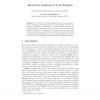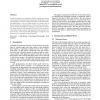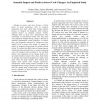120
Voted
CAV
2011
Springer
14 years 6 months ago
2011
Springer
Abstract. We describe a tool that applies theorem proving technology to synthesize code fragments that use given library functions. To determine candidate code fragments, our appro...
136
Voted
COMPSAC
2002
IEEE
15 years 7 months ago
2002
IEEE
Large multi-platform, multi-million lines of codes software systems evolve to cope with new platform or to meet user ever changing needs. While there has been several studies focu...
135
Voted
PLDI
2005
ACM
15 years 8 months ago
2005
ACM
Reuse of existing code from class libraries and frameworks is often difficult because APIs are complex and the client code required to use the APIs can be hard to write. We obser...
117
Voted
ACSC
2006
IEEE
15 years 8 months ago
2006
IEEE
Despite its long history and its benefits, software reuse has yet to become a common practise among software programmers. While there is much ongoing research, it focuses on larg...
140
Voted
TLCA
2009
Springer
15 years 9 months ago
2009
Springer
Taha and Nielsen have developed a multi-stage calculus λα with a sound type system using the notion of environment classifiers. They are special identifiers, with which code fr...
122
Voted
IWPC
2009
IEEE
15 years 9 months ago
2009
IEEE
In this paper, we introduce a technique for applying Independent Component Analysis to vector space representations of software code fragments such as methods or blocks. The dista...
107
Voted
IWPC
2009
IEEE
15 years 9 months ago
2009
IEEE
Comprehending an unfamiliar code fragment requires an awareness of explicit usage directives that may be present in the documentation of some invoked functions. Since it is not pr...
126
Voted
ICSE
2009
IEEE-ACM
15 years 9 months ago
2009
IEEE-ACM
When programmers develop or maintain software, they instinctively sense that there are fragments of code that other developers implemented somewhere, and these code fragments coul...
152
Voted
ASWEC
2009
IEEE
15 years 9 months ago
2009
IEEE
Changes to source code have become a critical factor in fault predictions. Text or syntactic approaches have been widely used. Textual analysis focuses on changed text fragments w...



